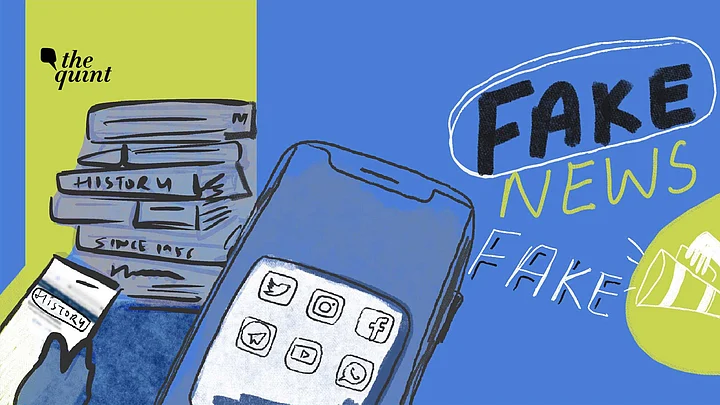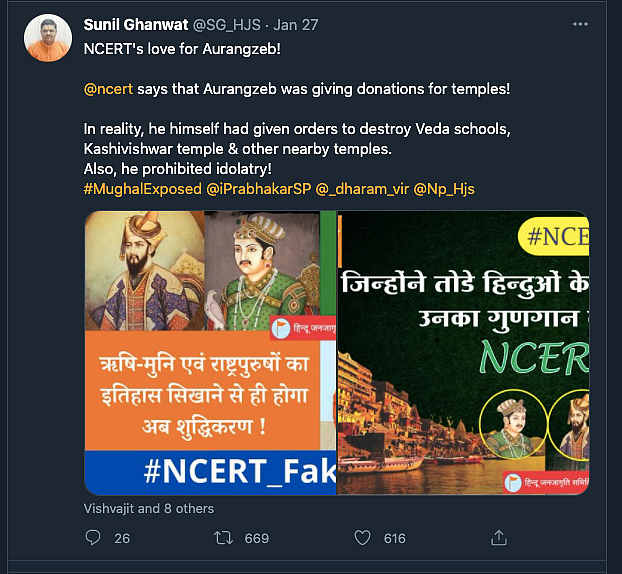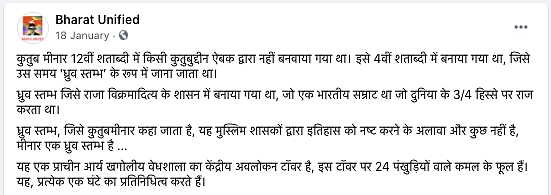(This story was first published on 6 April 2021. It has been reposted from The Quint's archives in light of the Information Technology Ministry removing a paragraph on the Mughal Empire from the ‘Culture and Heritage’ section on the knowindia.gov.in website.)
In January 2021, an RTI response received from the National Council of Educational Research and Training (NCERT) – an autonomous body under the government of India – by one Shivank Varma, made it to news headlines and primetime television debates.
The query was about a paragraph in a Class 12 history textbook which mentioned that Mughal rulers gave grants to repair temples destroyed during war and how many such temples were repaired.
But the response that no such information is “available in the files of the department” triggered a massive debate on the authenticity of textbooks and our education system’s whitewashing of the “real history” of India.
The Quint spoke to several RTI experts and historians who pointed out that the NCERT not being able to furnish a source to back the claim doesn’t mean the assertion that Mughal rulers gave grants to repair and build Hindu temples is false. Several historians studying Indian and South Asian history over the years have documented how different Mughal rulers plundered temples but at the same time, also gave grants for their construction and maintenance.
They further told us that the NCERT textbook controversy is not an isolated case. Different people at different times in different societies have attempted to distort history, but with the advent of the internet and social media, disinformation has become an easy and powerful tool to challenge existing historical facts.
This reporter tracked several groups, pages and accounts on Facebook and Twitter for several weeks to understand how users on the internet are retelling history without evidence and to identify the stakeholders who are aiding this.
Forget Textbooks, Social Media Is the History Source of ‘New India’
Much like everything else, social media platforms – primarily Facebook, WhatsApp and Twitter – have become the 'go to' sources for popular discourse around issues concerning the history of the Indian subcontinent.
Let’s take the NCERT textbook controversy, for example.
Soon after NCERT’s response to the RTI was made public, Kreately.in – a Twitter handle promoted by BJP leader Kapil Mishra – made a case for an overhaul of India’s education in order to rewrite history.
This demand was also echoed by several other users with thousands of followers on Facebook and Twitter.
Even though these users blamed NCERT for “selective brainwashing of students” by including “fake Mughal history” in its textbooks, evidence recorded in multiple books by historians over the years state otherwise.
This excerpt from historian Audrey Truschke’s book Aurangzeb The Man and The Myth clearly notes that Hindu and Jain temples dotted the landscape of Aurangzeb’s kingdom. “These religious institutions were entitled to Mughal state protection, and Aurangzeb generally endeavoured to ensure their well-being. By the same token, from a Mughal perspective, that goodwill could be revoked when specific temples or their associates acted against imperial interests,” Truschke wrote.
Another report published by the Times of India in 2015 documents how Aurangzeb and other Mughal rulers, including Akbar, frequently gave temple grants.
Truschke is an associate professor of South Asian History at the Rutgers University in New Jersey, US.
In an email exchange with The Quint, she mentioned the controversy around Aurangzeb and other Mughal rulers and said that it is the “far right that stands to gain from these attacks on Mughal history”.
“Modern attacks on Mughal history have modern stakes. These are not about understanding the past in any meaningful sense, rather attempts to remake the present often in horrifying ways. As is so often the case with rewriting of the past across the globe, the far right and their hateful agenda stands to gain.”Audrey Truschke, Associate Professor (South Asian History) at Rutgers University
Truschke has regularly been criticised by the Hindu right wing in India for her research into Indian history. In a tweet on 9 March 2021, she detailed how she has been facing "an avalanche of hate speech, anti-Muslim sentiments, misogyny and violent threats endangering her family" because of her work revolving around Indian history.
Earlier, in an account published in July 2020, she recollected how she has been constantly threatened and harassed on social media by coordinated hate campaigns because “her views do not corroborate with those of Hindu nationalists”.
Why Was NCERT Not Able to Provide Any Evidence?
This then begs another question: If evidence is available in the public domain, why was NCERT not able to support its argument?
We spoke to RTI activist Venkatesh Nayak who told us that while there is no bar on filing RTIs on any topic under the sun, this one seems particularly mischievous.
“The question asked in this RTI is best answered by history books. School text books are not university-level tomes which require extensive footnoting to support the authors’ claims and statements. The PIO (Public Information Officer) wouldn’t have read the volumes of Mughal history written by subject experts from which this line would’ve been culled out and so, it wouldn’t be part of the ‘official record’.”Venkatesh Nayak, RTI Activist
He further added that submitting an RTI explanation itself is the exercise of the right to freedom of speech and expression. But being a fundamental right, it must be used in a responsible manner.
While social media makes the access to historical knowledge available beyond academic silos, these platforms have also become the breeding grounds of mis/disinformation with little to no way of checking the veracity of the content that is being shared.
The Quint spoke to Visvak Ponnavolu, a Chevening scholar in South Asian Studies and founder of India Ink – a digital publication which aims to simplify academic history for readers.
Ponnavolu told us that academia has a lot of well-researched knowledge, facts and theories about Indian history, which doesn’t reach the lives of ordinary people because of lack of access.
“While the internet is an important medium to provide people with easy access to academia and informed narratives, most people don’t seem to care about the source of information they receive via social media. It’s a challenge for people like us to make people understand the importance of questioning their sources and that is something we are constantly working towards achieving.”Visvak Ponnavolu – Founder, India Inc
For the purpose of this story, we tracked the activities of accounts, pages and groups on Twitter and Facebook that relayed conspiracy theories, unverified “historical facts” and distorted versions of events otherwise well-documented by historians to create and further a certain narrative.
In the subsequent sections, we will demonstrate how these pages not only share false information which creates a wrong narrative but also amplifies this misinformation.
Journey of a Lie: How Fake News Ends Up Becoming 'Real'
During the course of our investigation, we observed and noted the role of right wing influencers, politicians, propaganda websites and mainstream media in spreading disinformation and propaganda related to Indian history.
For the purpose of demonstration, let’s stick to the NCERT textbook controversy.
On 13 January, right-wing propaganda website OpIndia published a report based on the said RTI.
A day after, on 14 January, RSS mouthpiece, Organiser picked up the issue claiming that distortion of Indian history has been a long driven agenda of left-wing historians and that the “NCERT history textbooks, mostly written by those pseudo-historians, have been used as propaganda tools”.
By 15 January, the RTI response was all over the internet after it was picked by multiple right-wing propaganda websites with some even claiming that NCERT has “betrayed Hindus” by publishing fake history glorifying Mughal rulers and those responsible for publishing this should be “imprisoned for life”.
At the same time, we saw massive activity building up on social media with tweets under hashtags like #Aurangzeb and #NCERT. In fact, on 16 January, #NCERT_Fakes_History was trending on number 4 in India with over 38,000 tweets.
Soon after, the controversy was picked by several mainstream media organisations, both print and TV, who further amplified this claim without basic verification and fact-checking.
Indian History Is Facing an Existential Crisis, Thanks to Disinformation
Truschke argues that this is not the first time that well-documented historical events have been challenged by the mainstreaming of alternate facts through a systematic process. However, things are particularly bad in modern-day India.
“The Hindu Right did not invent politicians lying about the past. But this is particularly extreme in modern-day India. It is contributing to making India an outlier among the world’s democracies.”
During the course of this story, we came across several historical myths and conspiracy theories which do not stand the test of facts but are widely popular on social media.
While some of these claims like the Taj Mahal and Qutub Minar being a Hindu temple and a watch tower, respectively, have found their way into the mainstream from obscure fringe corners of the internet, others gain steam right before elections or other significant political events.
For example, ahead of the 2021 West Bengal Assembly elections, an unfounded claim stating that Netaji Subhash Chandra Bose and not Jawaharlal Nehru was India’s first prime minister, spread like wildfire on the internet.
The ‘Serial Offenders’ and ‘Super Spreaders’
While tracking how fake news around different historical events makes its way through social media, we observed that there were some accounts with a large network of followers on Twitter and Facebook which regularly relayed disinformation.
They either acted as the source of disinformation or worked towards its amplification. Further, because of their large following, m/disinformation broadcast by these channels spread across the internet.
We were able to categorise these accounts/pages into two groups – those exclusively dedicated to content around history and those which amplify fake claims around history alongside other content.
The first category includes Facebook groups and pages like ‘Indian History ~ Real Truth’, ‘Bharat Unified’ and Twitter accounts like True Indology (now, @BharadwajSpeaks).
The second category includes social media handles of popular influencers, politicians and political parties which frequently function as channels of disinformation.
We found instances where disinformation related to Indian history was shared by the official Twitter handles of the BJP, several of its functionaries and further amplified by influencers like Rishi Bagree.
Is Documented Indian History Plagued With ‘Left Wing And Colonial Bias’?
When confronted with sources and citations, an oft-repeated excuse given by those who share disinformation around history is that academic research in India has a left-wing bias and historians in modern India have resorted to a colonial approach to study Indian history.
However, both Visavak Ponnavolu and Audrey Truschke refute this claim. “It would be bizarre to say that all or even a significant number of historians who have produced the corpus or the body of work that exists on Indian history, over centuries, identify themselves as left wing historians,” says Ponnavolu.
“Indian history has been produced by a diverse group of historians which includes British colonial officers, their agents, orientalists sitting in Germany and Britain at the height of the British empire and even Indian nationalists. Who are these left-wing historians? Even if you talk to historians who’ve contributed to post-independence Indian history, not at all of them would identify as left wing.”Visvak Ponnavolu, Founder, India Ink
Works of right wing and conservative intellectuals like MJ Akbar, Tavleen Singh, Shakti Sinha and Kapil Kumar continue to shape academia in India.
Akbar, a journalist and politician, has authored several books. His famous works include ‘Nehru: The Making of India’ and ‘Kashmir: Behind The Vale’. Tavleen Singh, another veteran journalist and columnist, too has authored books covering several subjects. Her notable works include ‘Durbar’ and ‘Kashmir — A Tragedy of Errors’. Similarly, Shakti Sinha (Vajpayee — The Years That Changed India; Patel — Political Ideas and Policies) and Kapil Kumar (Congress and Classes — Nationalism, Workers and Peasants) are all distinguished professionals whose works are part of the curriculum in several universities.
Audrey Truschke believes that it is important to approach South Asian history through different lenses, and one of them is the colonial lens. She adds that while historians strive to be as objective as possible, real world politics does and should influence their work.
“Scholarship comes with its own set of precepts and values, which do not map onto right or left in terms of contemporary politics. We all train for years and continue learning for decades regarding how to think about and adjudicate the facts of the past. It is a complicated, nuanced affair.”Audrey Truschke, Associate Professor (South Asian History), Rutgers University
To understand this further, we decided to look at the process by which Truschke in her book concluded that Aurangzeb, in addition to plundering temples, gave grants for their maintenance.
Dedicating an entire chapter to Aurangzeb’s relationship with the Hindu religious communities, Truschke quotes a dozen sources to put forth both sides of the argument – Aurangzeb as a protector and a destroyer of Hindu temples.
Truschke’s sources and citations range from works of American historian Richard Eaton to writings of politician Mukhtar Ahmed Ansari and Kalimat-i Taiyibat – a collection of Aurangzeb’s orders, thus highlighting the importance of the process followed by historians to reach a certain conclusion.
History or the study of the past is not a black and white affair which makes it an easy target of disinformation and fake news. In a post-truth world, with objective facts becoming less and less important, experts emphasise on the need to understand that history isn’t about conclusions but about the process by which one reaches those conclusions.
Or, as Ponnavolu puts it, “You can never be sure about the accuracy of a historical fact, but you can be sure about the process by which that fact has been reached at. This is the only difference between academic scholarship and wild conspiracy theories.”
(Not convinced of a post or information you came across online and want it verified? Send us the details on WhatsApp at 9643651818, or e-mail it to us at webqoof@thequint.com and we'll fact-check it for you. You can also read all our fact-checked stories here.)















